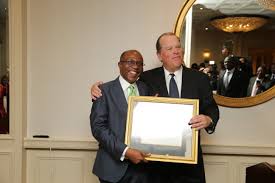There are no products in your shopping cart.
| 0 Items | £0.00 |

 CENTRAL Bank of Nigeria (CBN) governor Godwin Emefiele has assured international investors and the international community that Nigeria is now ready to resume receiving foreign direct investment (FDI) now that the elections are over.
CENTRAL Bank of Nigeria (CBN) governor Godwin Emefiele has assured international investors and the international community that Nigeria is now ready to resume receiving foreign direct investment (FDI) now that the elections are over.
In February and march, Nigeria held presidential, National Assembly, gubernatorial and state houses of assembly elections during which many investors halted operations for fear of violence. Some project managers like those working on the Lagos to Ibadan railway project for instance, left Nigeria and did not return until after the polls and they were assured there would be no violence.
In Washington DC yesterday on the sidelines of the World Bank/IMF Spring Meeting, Mr Emefiele held an informal meeting with potential investors where he enticed them with the Nigerian success stories, especially in agriculture. He pointed out that the Anchor Borrowers Programme, which targets local farmers was one of the major achievements of the bank under its development interventions.
Mr Emefiele said: “As at December 2018, a total sum of N178.48bn ($493m) had been disbursed through 19 participating financial institutions to 902,518 farmers. During the period, over 2.8m and 8.4m direct and indirect jobs were created under the Anchor Borrowers Programme."
On Nigeria's foreign exchange policy, Mr Emefiele said that the focus had always been to ensure price stability. He highlighted some of the foreign exchange reforms undertaken by the bank, which included the banning of the 41 items, the establishment of the investor’s and export’s window and the SME Window of the foreign exchange market.
According to Mr Emefiele, this resulted in stable exchange rates, foreign exchange liquidity, vibrancy in the capital market, improved supply of foreign exchange supply with positive impact on gross domestic product (GDP) growth. He said also that Nigeria, through its financial inclusion strategy had recorded a lot of progress in giving its adult population access to a broad range of formal financial services at an affordable cost.
Statistics shows that in Nigeria today, the number of adult with access to financial services has grown from 58.4% in 2016 to 63.2% in 2018 according to Mr Emefiele. He assured potential investors of the safety of their investments should they choose to take a leap of faith and make a mutually beneficial investment in the country.
“A lot of work has been done and indeed a lot of work needs to be done but in the midst of this, we are saying that Nigeria is open for business and foreign investors. As the monetary and fiscal authority continue to work tirelessly to boost our economy, it is important to portray some of Nigeria’s enduring strength which offers significant reward for current and prospective foreign investors.
“I want you to know that irrespective of the impact of the recession, Nigeria’s economy remains the largest in Africa by the size of its GDP with diversified opportunities across different sectors. These sectors include ICT, manufacturing, solid minerals, trade and agriculture,” Mr Emefiele said.